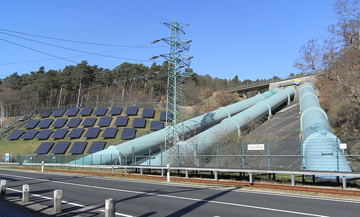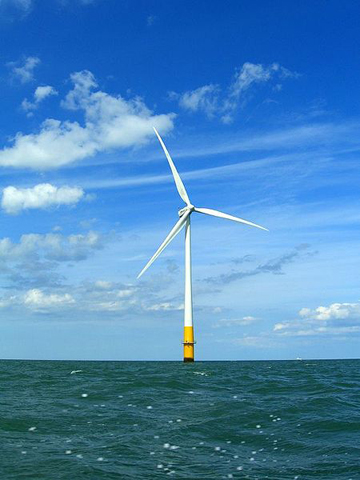Jeremy Hance
mongabay.com
May 17, 2011
mongabay.com
May 17, 2011
Germany
If this is truly the beginning of the energy shift that environmentalists have been advocating for years—and that's a big 'if'—the tragic twist to this story will be the connection between a brutal natural disaster and two government's sudden embrace of aggressively—rather than languidly, some may even say sluggishly—going green.
On March 11th tragedy struck Japan in the form of a practically unprecedented 9.0 earthquake and subsequent tsunami. Over 15,000 perished (and probably more) while entire cities were decimated. But the immediate disaster toll wasn't the only problem. The earthquake also lead to a full meltdown, only recently admitted, at Fukushima nuclear power plant, a crisis that is ongoing.
For Germany, which receives 25 percent of its energy from nuclear power, the meltdown at Fukushima may well be a game-changer.
 Energy park in Germany: solar on the left, hydro on the right. Photo by: Quartl. |
Merkel, who had only last year decided to extend the lifetime of its nuclear reactors, has now decided to phase out all 17 nuclear plants and move not to coal or natural gas, but renewable energy. While nuclear is considered by some as 'renewable' or 'green' due to its lack of carbon emissions, it obviously has significant drawbacks, from instability to an intractable waste issue. But the point here is not so much that Germany is moving away from nuclear, as it is moving wholly towards truly green energy: wind, solar, tidal, biomass, geothermal, etc.
In nine years it wants to double the share of renewable non-nuclear energy, reaching 35 percent of total energy consumption by 2020. Ten years later Germany hopes to half the country powered by renewables and over 80 percent by 2050. Even without nuclear energy, Germany is still committed to slicing carbon CO2 emissions from 1990 levels by 40 percent in 2020 and more than 80 percent in 2050.
Such a push toward renewables in the heavyweight economy of Europe could be a game-changer for green energy businesses. Germany's economy has also remained relatively robust in the face of the 2008 economic crisis, which makes it a focal point for investors abroad. The country already has a leg-up on green investment: in 2010, it had the 2nd highest investment in green energy (after China) with $41.2 billion, beating out number 3, the US, by nearly $10 billion. For its part, the US is falling far behind others in the green race.
Japan
Following the nuclear meltdown at Fukushima, Japan has announced it is scrapping plans for 14 new nuclear reactors and will begin weaning itself off nuclear power.
"Taking this as a lesson, we will lead the world in clean energy such as solar and biomass, as we take a step toward resurrection," Prime Minister Naoto Kan recently said.
He has also stated that both renewable energy and increasing energy efficiency will be the two new 'pillars' in Japan's energy policy.
Japan has already committed to reducing greenhouse gas emissions from 1990 levels by 25 percent by 2020, and 80 percent by 2050. But this means Japan will have to depend on renewable technologies, such as wind and solar, instead of nuclear if it's to still meet its goals.
Kan has not given many specifics on his new energy plan, not surprising given he is still in the throes of a national nuclear crisis. But if Japan, the world's number three economy, makes a quick switch to green, it would likely spur investment, interest, and enthusiasm around the world.
Britain
Today, Britain has announced that it is committing itself—legally—to cut greenhouse gas emissions by 50% in just over 15 years (by 2027) from 1990 levels. Conservative Prime Minister David Cameron accepted the view of his independent climate advisors, the Committee on Climate Change, that the UK required gutsy cuts to stay competitive in a global market as well as to meet its pledges.
 Kentish Flats wind power in the UK. Photo by: Phil Hollman. |
"This is an outstanding example of the kind of action by developed world countries that’s needed to bring climate change under control," Bert Metz, an adviser to the European Climate Foundation, a research body based in Brussels told the New York Times. "It’s also really going to push the British economy in the direction of growth."
UK Energy Secretary, Chris Huhne, stressed that the goal would "establish our competitive advantage in the most rapidly growing sectors of the world economy."
Unlike Germany and Japan, the UK does not view new nuclear as anathema after Fukushima, and a slice emissions reductions may be in the form of nuclear power, though its still unclear if the British public will accept more nuclear. However, among officials wind, especially off-shore, is seen as the holy grail of green energy in the UK.
Going forward
So, the question is will Germany, Japan, and the UK actually stand by their promises to push toward a renewable revolution?
Germany's about-face was so rapid, and surprising, that a falling back would not be unexpected; Japan is vague on the details; and the UK snuck in a get-out-of-green clause that could undercut its pledge.
And even if these nations do succeed in moving rapidly to renewable will their subsequent lessons, know-how, and technology actually create a domino effect for the rest of the world?
Will China move quickly enough in its renewable ambitions? Will the US still staunchly refuse to address climate change? Will Canada continue to undercut climate negotiations?
So far naysayers have said a green revolution is simply too costly, especially in hard economic times. However, proponents argue that going green would boost both the economy and jobs. In fact, they say a green economy may move the world beyond the economic slump.
 Solar power trough in the US. Photo by: Sandia National Laboratory. |
Scientists and futurists have long predicted that eventually society would be entirely run on renewable non-polluting energy—such as the sun—creating a healthier (significantly less pollution), more just (no more oil conflict), more democratic (the sun shines and the wind blows on everyone), and less climatically instable world.
Could it be that Germany, Japan, and UK may be the first to make this dream a reality? Will 2011 be a watershed for global society? Only the future can tell.
Retrieved from http://news.mongabay.com/2011/0517-hance_green_energy.html
* color and emphasis added by the blogger
No comments:
Post a Comment